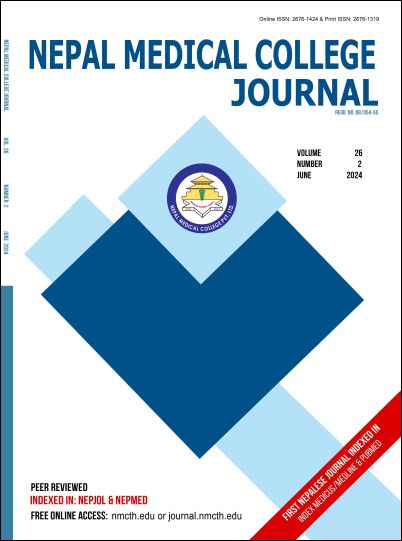Discharge Against Medical Advice Among Neonates Admitted to the Neonatal Intensive Care Unit of a Tertiary Care Hospital
DOI:
https://doi.org/10.3126/nmcj.v26i2.67213Keywords:
Discharge against medical advice, neonates, prevalenceAbstract
Discharge against medical advice is a condition where patient leaves the hospital against physician’s advice and is a serious public health issue, especially among neonates and a challenge faced commonly by physicians. It is a risk factor that can lead to adverse events like mortality and readmissions in neonatal units. To decrease neonatal mortality rate, it is necessary to investigate the causes leading to self-discharge. This study aimed to find out prevalence and reasons for discharge against medical advice among neonates admitted to neonatal intensive care units of a tertiary care hospital. A descriptive cross-sectional study was conducted among neonates admitted to the Neonatal Intensive Care Units who were discharge against medical advice (DAMA) from 15th March 2022 to 14th March 2023 after obtaining ethical approval from the Institutional Review Committee (Reference number: F-NMC/544/078-079). Neonatal demographic information and reason for self discharged were recorded. A convenience sampling method was used among neonates who met eligibility criteria. Data were presented as frequency with percentage. A point estimate with 95% confidence interval was calculated. Out of 910 neonates admitted to NICU, 86 (9.4%; 95% CI:7.62-11.53) were discharged against medical advice. Among these, 72 (83.7%) were outborn neonates and 51 (59.3%) male. The most common morbidity was sepsis 53 (61.6%). The common reasons for parents to take DAMA was poor financial condition 72 (83.7%). The prevalence of discharge against medical advice among neonates admitted in the neonatal intensive care units was similar to other studies done in similar settings.
Downloads
Downloads
Published
How to Cite
Issue
Section
License
Copyright (c) 2024 Nepal Medical College Journal

This work is licensed under a Creative Commons Attribution 4.0 International License.
This license enables reusers to distribute, remix, adapt, and build upon the material in any medium or format, so long as attribution is given to the creator. The license allows for commercial use.




